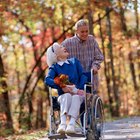
Photos.com/Photos.com/Getty Images
Seniors often face challenges to adequate and affordable housing due to limited incomes, decreased mobility and high health care costs. Federal and state governments can provide rental assistance to low-income seniors, primarily through the Department of Housing and Urban Development, or HUD. HUD-based rental assistance for seniors is administered at the local level. You must contact your local housing agency for application and eligibility information.
Common Eligibility Criteria
Although specific criteria may vary by city and program, there's generally a minimum age limit and income limits to qualify for assistance. Your local public housing agency, or PHA, determines the exact eligibility criteria and application process for the area you are interested in living. The HUD website offers PHA contact information for all states. An attorney that specializes in government benefits may also be able to help you locate and apply for senior rental assistance programs. Your state and county human service and social service agencies are also good places to start when looking for senior rent assistance programs.
Low-Rent Apartments
HUD provides funds to apartment owners so they can set aside a specific number of units for low income seniors at a lowered rent rate. These units are known as low-rent apartments, and HUD offers a search tool on its website to locate these. Visit the management office of the apartment building to inquire about the application process and apply.
Public Housing and Section 8 Vouchers
HUD also offers seniors rental assistance via public housing and the Section 8 Housing Choice Voucher Program. A Section 8 voucher allows you to choose any rental property, whether apartment or house, and use the voucher to subsidize, or pay a portion of, the rent. The rental unit must pass HUD's inspection for safety and adequacy for the senior. HUD's affordable housing program, also known as public housing, are rental units owned and operated by the local PHA. These may be single-family houses or apartment buildings. In general, seniors pay no more than 30 percent of monthly income for HUD-based housing. They must also meet their area's low-income and very low-income limits as outlined by HUD. The local PHA can help seniors with the specific limits for their area and the application process.
Application Considerations
You must present the following proofs of income to determine whether you qualify for any of the senior rental assistance programs offered by your state or HUD:
- Wages, salaries, tips, and bonuses
- Net income from a business
- Interest, dividends, and other net income from real estate
- Social Security, annuities, insurance policies, retirement funds, pensions, disability, or death benefits
- Unemployment, worker's compensation, severance pay, etc.
- Welfare
- Alimony or child support
Related Articles

Problems Facing Elderly Living Alone

How to Get Emergency Cash Assistance

How Much Money Does a Refugee Get from ...

Ontario Grants for Family to Care for ...

Qualifications to Enter a State-Run ...

How to Help a Homeless Person if He Is ...

Grants for Private Christian Schools

How to Get Paid to Care for a Relative

How to Get Paid to Care for Someone on ...

Income Limits for Food Stamps & ...

How Much Are Monthly Disability ...

How to Get Paid to Stay Home & Care for ...

Requirements for In-Home Daycare in ...

Costs for Ideal Image Treatments

How to Trace Your Family Tree for Free

How do I Purchase Master Card & Visa ...

Pennsylvania Grants for Adopted Children

New Salon Design Regulations in ...

How to Open a Daycare in North Carolina

Programs to Take Care of a Disabled ...
References
Resources
Tips
- When looking for an apartment, check the ratings with the Better Business Bureau, the Equal Housing Authority and Neighborhood Associations. Get feedback on safety issues in the area. Check for wheelchair or easy accessibility in the building and in the apartments. Look for railings in hallways and bathrooms. Be alert for signs of mold, mice or insect infestation. Check with the Building Code inspectors for any violations.
Warnings
- Check with government agencies about changes in income limits for rental assistance programs every year.
- Report any uncorrected infractions in living conditions and safety to the appropriate government agency while living in the apartment.
Writer Bio
Karina C. Hernandez is a real estate agent in San Diego since 2004. She has a background in mortgage finance and cosmetics and has written home & garden, housing and beauty articles for multiple internet channels over the past 10 years. She has a B.A. in English from UCLA.
Photo Credits
Photos.com/Photos.com/Getty Images